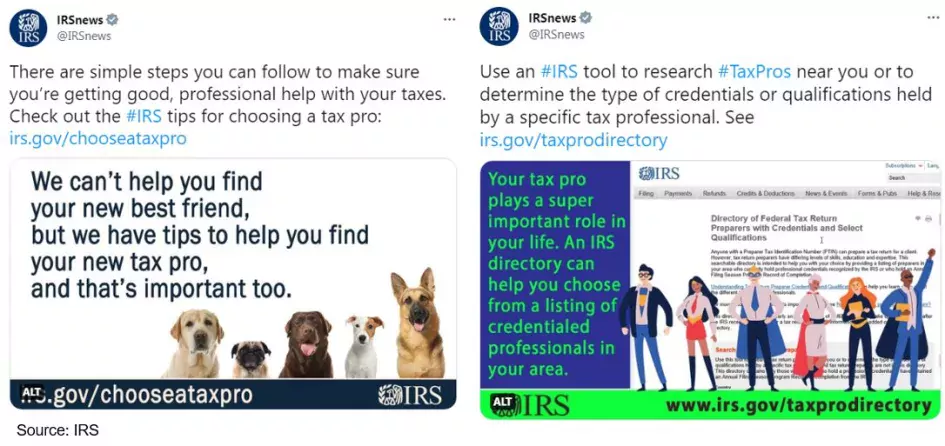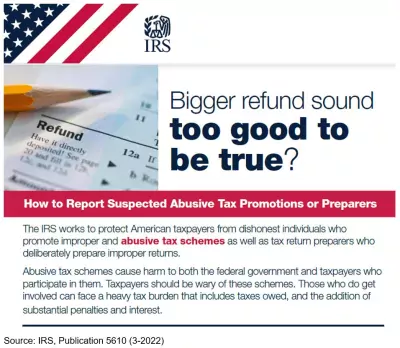As Tax Filing Season Begins, We Look At Ways To Better Protect Taxpayers From Abusive Tax Schemes and Those Who Promote Them
The deadline to file federal income taxes is April 18.
Filling out and filing tax forms correctly can be confusing for many, which is why about half of all taxpayers turn to a paid preparer. However, not all tax return preparers are equal. While many preparers help taxpayers navigate complicated tax laws, others may introduce errors or promote tax schemes, which can get you in trouble with IRS.
IRS has taken steps to alert taxpayers to potential schemes, including an extensive Twitter campaign and its annual Dirty Dozen publication. Today’s WatchBlog post looks at our two recent reports about additional ways IRS and Congress could help better protect taxpayers.
Image

Not all paid preparers help taxpayers correctly fill and file their returns
Millions of Americans benefit from refundable tax credits designed to help offset the costs of working, raising children, and pursuing higher education. However, these credits have complex eligibility rules that can be difficult to follow. These credits can also be subject to fraud schemes and efforts to intentionally misstate taxpayer eligibility and overclaim these credits, which can get taxpayers in trouble with IRS.
About half of taxpayers who claimed these credits used a paid preparer to help them. However, we found that a substantial number of these preparers were not subject to IRS registration, competency testing, and educational requirements. These “unenrolled” preparers have higher error rates than taxpayers who choose to prepare their own returns.
Requiring all preparers to comply with IRS standards would better protect taxpayers from unqualified and unscrupulous preparers while helping taxpayers prepare more accurate returns and avoid trouble with IRS. But IRS doesn’t currently have this authority. So, we asked Congress to consider giving IRS the authority to establish professional requirements for paid preparers to help protect taxpayers.
How well is IRS detecting and deterring abusive tax schemes?
In December, we reported that IRS is investigating over 40 types of abusive tax schemes and those who promote them. Many of these schemes peak during filing season as people prepare their returns or hire someone to help with their taxes. IRS publishes information about tax schemes to avoid as part of its annual Dirty Dozen list. For example, bogus strategies designed to circumvent tax laws or evade taxes using trusts, other entities, or offshore accounts to conceal the true value and ownership of taxable income and assets.
Image

But while the Dirty Dozen list provides important information about twelve tax schemes to look out for each year, in recent years the list did not include instructions on how the public can report schemes and those that promote them to the IRS. We recommended that IRS include this information.
- Comments on GAO’s WatchBlog? Contact blog@gao.gov.
GAO Contacts
Related Products

GAO's mission is to provide Congress with fact-based, nonpartisan information that can help improve federal government performance and ensure accountability for the benefit of the American people. GAO launched its WatchBlog in January, 2014, as part of its continuing effort to reach its audiences—Congress and the American people—where they are currently looking for information.
The blog format allows GAO to provide a little more context about its work than it can offer on its other social media platforms. Posts will tie GAO work to current events and the news; show how GAO’s work is affecting agencies or legislation; highlight reports, testimonies, and issue areas where GAO does work; and provide information about GAO itself, among other things.
Please send any feedback on GAO's WatchBlog to blog@gao.gov.




